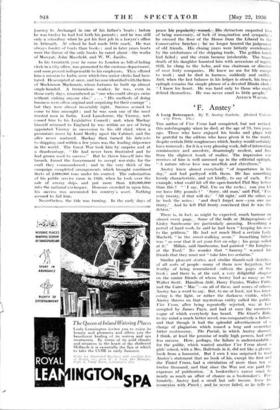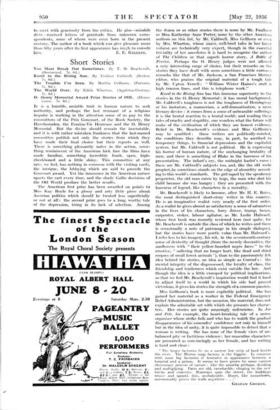F Anstey '
THE author of Vice Versa had. completed, but not revised, this autobiography when he died, at the age of 78, two years ago. Those who have enjoyed his books and plays will be grateful to the editors who have given it to the world, despite certain little roughnesses which Anstey World certainly have removed ; for it is a very pleasing work, full of interesting reminiscence and anecdote, disarmingly modest, and free from the slightest touch of malice. The impression one receives of him is well summed up in the editorial epitaph,
" A nature whose love was unselfish and chivalrous " •
Anstey knew almost everybody " of importance in his day," and had parleyed with them. He has something keenly characteristic, and yet kindly, to say of each. For example, what could hit off'theolien-handed Phil May better than this ? " I say, Phil, I'm on the rocks ; can you let me have fifty pounds ? " Sorry, old man; said Phil, ' I've only twenty, if that will do.' All right,' said the other, as he took the notes ; ` and don't forget now—you civye me thirty. . And he left Phil firmlyeonvinced that ,he was the debtor."
There is, in fact, as might be expected, much- humour on almost every page. Some of the,,bulls or .,Malapropisms of Linley Sambourae -are futrtieularly amusing. Describing a period of hard work, he said he had been " keeping his awe to the gridiron." He had not -much- liked a- certain Lady Macbeth " in the street-walking scene." Something bitter was " so sour that it set your feet on edge ; his gorge rolled at it." Millais, said Sambourne, had painted " Sir Isinglass at the Ford." No wonder that " Sammy " warned his friends that they must not " take him too seriatim."
Similar pleasant stories, and similar thumb-nail sketches, of all sorts of people—many of them now forgotten. but Virorthy of being remembered—enliven the pages of the book ; and there is, at the end, a very delightful chapter on the canine friends of whom Anstey had as many as Sir Walter Scott. Hamilton Aide, Harry Furniss, Walter Frith. and the Cairn " Mac "—on all of these, and scores of others. Anstey has a word to say. But, to me at ieast; riot less inter- esting is the light, or rather the darkness visible, which Anstey throws on that mysterious entity, called the public. Viet'. 'Versa, after being repeatedly rejected, was at last accepted by James Pay n, and had at once; the -enormous vogue of which everybody has heard. The Giant's Robe, to my mind a much better novel, was comparatively a failure. and that though it had the splendid advertisement of a charge of plagiarism which roused a long and somewhat bitter controversy. The Pariah, in which Anstey showed. I think, at least the promise of really high powers, had still less success. Here, perhaps, the failure is understandable : for the public, which wanted another Vice Versa about a girls' school, with a Mrs. Bultitude in it, did not like a gloaniy book from a humorist. But I own I was -surprised to read Anstey's statement that no.book of-his, except the first and the Tinted Venus, had a clic-Illation of more than ten or twelve thousand, and that since the War not one paid the expenses --of publication. A bookwriter's career must be nearly as much an affair of chance as a bookmaker's. For- tunately, An,stey had, a small ,hut safe income front hi. connexion with Punch: and he never failed, as he tells us, to meet with generosity from the critics. He also—niirabik dicta—received letters of gratitude from unknown corre- spondents, some of whom were even born in the present century. The author of a book which can give pleasUre more than fifty years after its first appearance has much to console



















































 Previous page
Previous page